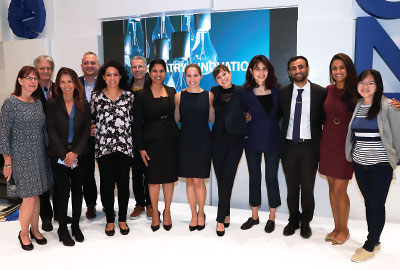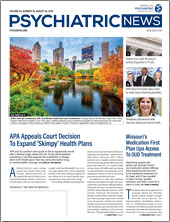On the late afternoon of Sunday, May 19, a team of friends and colleagues from the Icahn School of Medicine at Mount Sinai—resident Annie Hart and medical students Jordyn Feingold, Murad Khan, and Isobel Rosenthal—were finally ready to relax after a hectic day at the 2019 APA Annual Meeting. As finalists in APA’s Innovation Lab, a day-long entrepreneurial competition in which participating teams pitch their transformative ideas for mental health care, they had spent the better part of the day promoting and refining their idea: Medimmunity, an online platform to help prevent burnout in medical trainees.
All that was left now was the announcement of the grand prize winner, with which the quartet did not concern themselves. “We were impressed by all the finalists, and some of them already had companies that were up and running,” Feingold said. The team figured their project—still in the conceptual stage—was not at a scale to win the grand prize.
Not that it mattered; team members had already achieved their goals. They had made several business contacts and had received valuable feedback from leaders in innovation that would help them take Medimmunity from concept to reality. (They particularly cited Elle Wang, Ph.D., a product manager at Thrive Global, and Gowri Agaram, M.D., the co-founder and chief clinical officer at Stanford’s Brainstorm Lab, who served as their in-competition mentors.)
They were ready to enjoy the rest of the APA meeting. And then the judges announced their team as the grand prize winners.
“It was so surreal going up to get our prize,” said Rosenthal. “We didn’t even plan any acceptance speeches in advance.”
Feingold credits the win in some part to the fact that her team was the only student-run finalist. But another likely factor was that the judges understood how prevalent and damaging medical burnout has become. “Medicine is in such dire need of healing itself,” she told Psychiatric News.
Beating Burnout
Feingold has had this desire to tackle medical burnout for years. After finishing college, she spent a year to earn a master’s degree in positive psychology prior to applying to medical school. She came to Icahn in 2016 looking to translate her studies of positivity into practice. As with many first-year students, Feingold was a little overwhelmed, but she soon found a compatriot in Hart, then a fourth-year student and now a resident at Mount Sinai.
Hart knew firsthand the danger of untreated burnout, having recently lost a classmate to suicide. Looking for a way to support trainees and prevent future incidents, she and Feingold developed a student-led curriculum known as PEERS, Practice Enhancement, Engagement, Resilience, and Support.
The PEERS program pairs a small group of first-year medical students with a first-year resident, who leads two to three educational and skill-building sessions a year on topics like empathy and mindfulness. These sessions seek to build resilience while also providing a forum for students to speak openly. The student-resident groups are paired for all four years of training, creating a trusted support network over time.
The launch of PEERS brought Feingold and Hart into contact with Rosenthal and Khan, who also appreciated the importance of maintaining strong bonds among medical trainees.
“Medical school is a humbling journey that is also incredibly difficult—emotionally and physically. I found that my peers were imperative to my ability to get through the hard times whether it was talking to a friend after witnessing my first patient death or feeling overwhelmed by boards studying,” said Rosenthal, who along with Khan graduated this past May and has now started residency.
The quartet started looking at ways to expand the program. Rosenthal, who had taken a break during medical school to complete an M.B.A. with a focus on behavioral health technology, mentioned the ever-growing APA Innovation Lab competition.
“The challenges we face at Mount Sinai—the exhaustion, dealing with difficult patients, fear of coming forward with problems—these are ubiquitous,” Feingold said. “Why not create some way for [all trainees] to come together?”
The four team members meshed well, Khan said, “for each of us brought a skill set that complemented and challenged the others.” Feingold had the background in positive psychology, Hart had a clinical background in student mental health, Khan had a background in community organizing and social justice, and Rosenthal had a background in business and technology.
“But all four of us shared the desire to improve trainee wellness,” he continued.
Going National
The team plans to use the $10,000 that came with the Innovation Lab Grand Prize to turn the idea into a tangible product. The tentative plan is to start with a web-based portal accessible by computer, which is more cost-effective than a model based on a mobile app. Though Rosenthal and Khan are now residents, Rosenthal will remain at Mount Sinai along with Feingold and Hart, and Khan is only a short train ride away at Yale University, so the core team will continue to work together.
Medimmunity, as currently envisioned, would encompass three distinct areas. The first is a communication zone where medical trainees can post and reply to blogs on various topics related to wellness. The second is an online learning and resource center that will contain videos and worksheets that build important resiliency skills. The third area allows trainees to sign up for facilitated support groups.
The whole platform would be available through an institution-based subscription service. Medical schools would sign up for institutionwide access to Medimmunity, and it would be free to all trainees.
While Medimmunity would be a great resource to schools that don’t have in-house programs like PEERS, it could also be used at schools that already have resiliency and burnout curricula. For one, Medimmunity offers anonymity, which can benefit students who may not be ready to be open with people they know. Second, schools with existing infrastructure can offer advice and support to trainees who may want to initiate programs at their own institutions.
“We hope to provide this idea of an online community [to] help start a national conversation about burnout and how to prevent it,” Khan said. ■

